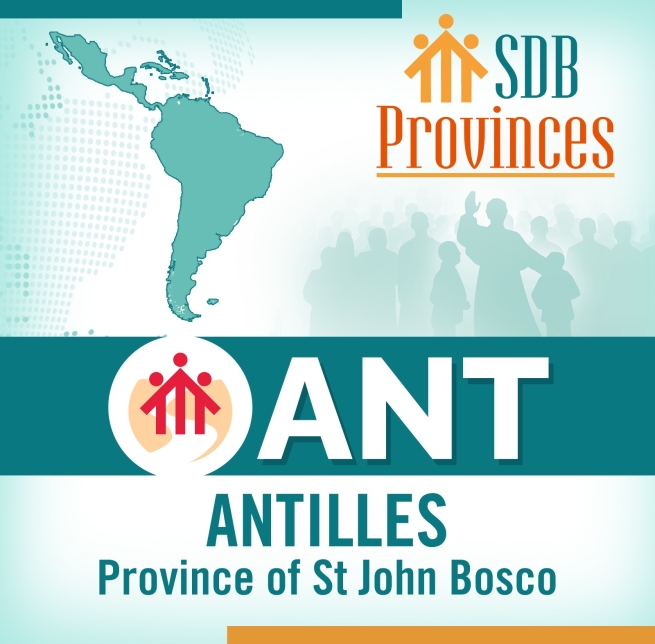The Salesian presence in the Greater Antilles dates back to 1917, initially dependent on the Tarraconense Province of Spain. In 1924 the houses in that area were entrusted to the Mexican Province, but in 1926, due to religious persecution in that country, the headquarters of that Province moved to La Víbora, near Havana, Cuba, and later also moved to Compostela, near Old Havana.
The canonical erection of the Antilles Province took place on 15 September 1953, under Fr Renato Ziggiotti’s time as Rector Major, and the founder of the Salesians, St John Bosco, was chosen as patron. With the beginning of the Castro revolution, in 1959, the Provincial Headquarters were transferred to the Dominican Republic, to Colegio Don Bosco located at 22, San Juan Bosco Street, near Santo Domingo, where it remained until 1993, when it was able to have its own premises, remaining in Santo Domingo, but moving to 52, 30 de Marzo Street.
The ANT province currently has 20 presences (4 in Cuba, 3 in Puerto Rico and 13 in the Dominican Republic). There are a total of 34 educational centres, 29 of which are run by lay principals: 15 primary schools, 14 secondary schools, 11 technical schools for vocational training.
The schools serve about 18,886 students, with about 1,323 teachers and lay coordinators; and on 2 February 2012, an inter-institutional agreement was signed between the Salesian Society in the Dominican Republic and the Ministry of Education of the Dominican Republic (MINERD) for the management of the schools. This has helped maintain the educational service, while keeping it faithful to the charism of service to the poorest.
There are also 18 parishes and 18 oratories and youth centres. To these must be added three family homes, part of the ‘Muchachos y Muchachas con Don Bosco’ (MDB) network for young people at high risk: the ‘Santo Domingo Savio’ school home, the ‘Quédate con nosotros’ (Stay with us) house and the ‘Casa Pinardi’. This network, with 12 centres, is one of the most important pastoral options in the Province.
In schools, oratories, parishes and homes there are about: 32 Salesian Cooperators and 52 Past Pupils of Don Bosco.
Currently, the Salesian Ecological Movement (ESM) has also been created as a body active across all Salesian works, and which gives shape to the Salesian concern for the care of creation, with well-defined programmes, porcesses and plans. Then there is also a formation programme for young leaders (PROFAJ), which recently celebrated its 40th anniversary; as well as a school for the formation of communicators, which graduates around 60 young people each year, and each year there is a congress on communication, on various topics.
In addition, an institution called the Salesian Family Joint Formation Programme (PROFOCO) was created, which offers workshops, conferences, spiritual exercises and a variety of teaching materials for the ongoing formation of young people, Salesians and the Salesian Family.
The Salesian Family in the West Indies is a very lively and committed reality, with a sustainable growth rate. There are about 410 Salesian Cooperators and about 55,000 past-pupils, of whom about 350 are committed. The Past Pupils hold their annual meetings in Salesian works, are proud to have grown up in a Salesian centre, and the Federation of Past Pupils of Don Bosco in the Antilles was created more than 12 years ago.
There are about 230 members of the Association of Mary Help of Christians (ADMA), and this is one of the groups that has grown the most in recent years. The Damas Salesianas (Salesian Women) are very involved in social, health and evangelisation projects; they number around 77, including a good number of elderly women who, due to their condition, do not participate in activities. There are 11 Daughters of the Sacred Hearts of Jesus and Mary running three presences. There are 115 Daughters of Mary Help of Christians with a significant number of elderly women. There are 109 Salesians of Don Bosco, 23 of whom are over 70.
The Salesian Family organises two meetings a year in the three countries: a retreat and a formation experience. In Cuba, national meetings are difficult because of the limited mobility possible between one Province and another. But both in Puerto Rico and the Dominican Republic, the Salesian Family is very active.
‘Today, together with hundreds of committed lay people, we continue to realise Don Bosco's dream: to accompany and form young people, especially the most vulnerable. We Salesians are not just history, we are the present and the future; and we continue to build bridges, sowing hope and reconciliation,' says the Provincial of ANT, Fr José Pastor Ramírez, in conclusion.
To better understand the reality of the ANT Province and its multifaceted and varied service to young people, a short video is available on ANSChannel presenting ‘the dreams of young people and the dream of Don Bosco’ in the three countries that make up the Province.
 Title
Title
Title
Title
 Title
Title
Title
Title
 Title
Title
Title
Title
 Title
Title
Title
Title
 Title
Title
Title
Title
 Title
Title
Title
Title
 Title
Title
Title
Title
 Title
Title
Title
Title
 Title
Title
Title
Title
https://www.infoans.org/en/component/k2/item/23401#sigProIda4a24f3f4d


